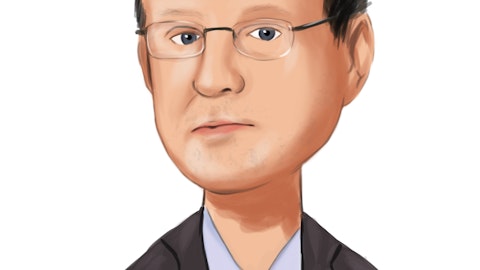Alex Twerdahl: Got it. I was wondering if you can give us any thoughts on sort of where you think you are in terms of deposit cost pressures. It seems like the pace of increase in deposit cost is certainly slowing. If you had any sort of thoughts on where that might peak out, if we should expect betas to continue to move higher or what you’re thinking there.
JP Lapointe: Yes. I think mostly, we’ve caught up. I think we have a little bit of brokered CDs that are maturing towards the end of the quarter that we’re in now. So I think once those reprice, we’ll kind of be mostly at the peak for where we should be barring any future potential rate hikes depending on what the Fed decides to do moving forward. But I think it’s definitely slowing down from where we were over the past year. And I think after next quarter, we should kind of be at the peak.
Alex Twerdahl: Got it. And then just as we think through the right level of non-interest expenses, any help that you could provide? I think this quarter was a little bit impacted by stock-based compensation, if I’m not mistaken. If you could help us, sort of, figure out sort of the right run rate, I guess, over the next few quarters.
Rick Wayne: I think — well, first, one point on the — and additionally, you’re right, it was a stock comp. But it was mostly because of the incentives, the equity that was granted at a higher stock price. There were some slight increase in the number of shares granted, but most of the increase was because the stock price was higher than when the previous ones were granted. But I think the number we have now, JP, we’re thinking that was about a good reasonable number for a run rate. Was there anything that you think unusual in this quarter, JP? Or is that a good number going forward?
JP Lapointe: I think that’s a pretty good number going forward. I don’t think we expect too much one way or the other in the next couple of quarters.
Rick Wayne: And now, you know this, Alex. So to the benefit of our listeners that are loan book has increased by almost $1 billion since December ‘22. And so therefore, higher operating expenses are not shocking.
Alex Twerdahl: Got it. And I guess just last question, back to the purchase market trends. Is it still safe to say that the bulk of what you’re seeing is being driven by the change in interest rates? Or are you seeing anything that’s being more — coming to the market from a credit perspective?
Pat Dignan: I think there is the transactions that fit in our sweet spot are largely being driven by liquidity issues and M&A.
Alex Twerdahl: Great. Thank you for taking all my question.
Rick Wayne: Thank you, Alex.
Operator: Thank you. [Operator Instructions] And I’m not showing any further questions at this time. Now I’ll turn the call over to Rick Wayne for closing remarks.
Rick Wayne: Thank you, and thank you those. Thank you, Alex, for your questions and others for listening in. And we look forward to another — our next conversation, not for the weather in January, but to reading again to talk about our quarterly results. Thank you all and have a good day.
Operator: Thank you. Ladies and gentlemen, this concludes today’s conference call. Thank you for participating. You may now disconnect. Everyone, have a great day.
Follow Northeast Bank (NASDAQ:NBN)
Follow Northeast Bank (NASDAQ:NBN)
Receive real-time insider trading and news alerts




